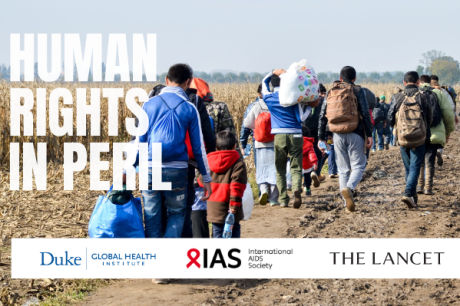
Hiba Fatima poses in front of the United Nations Headquarters in Geneva, Switzerland, where she participated in the Duke Geneva Global Health Fellows Program.
Published August 15, 2016, last updated on June 3, 2020 under Voices of DGHI
By Hiba Fatima, 2nd year MSc-GH candidate
This summer, Hiba participated in the Duke Geneva Global Health Fellows Program in Geneva, Switzerland.
In the global health field, we all have an idealistic streak, and when I first started my master’s in global health, I thought this tendency was curbed by the realities of economic burdens and cost of global public health goals.
Health economics is a “marriage” between two fields, and this is needed to achieve these goals. During my summer fellowship, we were lucky enough to learn about the current health economic landscape from Dr. Agnes Soucat. Currently, she is the Director of the Department of Health Systems Governance and Financing at the WHO. She is well known for co-authoring the “World Development Report: Making Services Work for Poor People” in 2004.
The number of low income countries is diminishing and more countries are achieving middle income status. This trend places them in a unique yet problematic situation where they will transition out of eligibility for foreign aid yet still lack the domestic resources and infrastructure required to solve their health problems.
Dr. Soucat stressed the importance of domestic resource mobilization and creating a health system that takes a curative and preventative approach towards illness. One example was the disparity in the amount of funds that donors had committed to Liberia and the amount that had actually been disbursed. If there is less dependence on foreign aid then countries like Liberia will have more agency to deal with sudden problems like the Ebola crisis. The overarching theme of her lecture was promoting low and middle income country ownership of their problems without leaning on support from international donors.
What I appreciated most about her lecture was her honesty and willingness to acknowledge previous strategies that did not work according to plan. For example, she brought up using a performance-based program, developed while at the World Bank, that would reward health professionals for good performances. However, this practice encouraged many people to exaggerate or fake their data to receive these rewards.
Dr. Soucat’s openness is a quality that all of us, as young global health professionals, could learn from. Many organizations also partake in this practice of discussing which of their initiatives didn’t work and why. While this may not have been her original intention, this aspect of her lecture was very influential for me and one of the strongest take-away points. If we are not willing to examine our practices, there is no way to truly evaluate and understand our impact and effectiveness.
Adopting this practice of looking back and seeing what did not work will be crucial when looking towards the future. Since we are the new generation of global health professionals, it will be upon us to achieve these goals in the SDG era.
This post was originally published on the 2016 Global Health Policy and Governance blog.


